It is clear the new enterprise perimeter is endpoints. Since the pandemic, however, several trends have converged, making these endpoints harder to manage and more vulnerable than ever. The trends include the increased use of commercial cloud applications, the pervasiveness of employee-owned devices, the transition to remote and hybrid working models, and the growth of corporate espionage and intellectual property theft. With the ever-changing business needs, managed service providers (MSPs) need to swiftly adapt their approach and provide customers with flexible and efficient solutions to stay relevant in a fast-paced industry.
User expectations in managed services have advanced. Today, providers must consider endpoint managed services and solutions that are scalable and adaptable across physical and cloud environments for fluid transformation.
Moving away from on-site IT infrastructure to cloud-based solutions will improve business continuity and save companies time and money. Here are three ways for MSPs to thrive in post-endpoint managed services:
1. Lean on digital services
Oftentimes MSP consultants may only recommend technologies they are most familiar with. However, true IT leadership means understanding what’s on the horizon and consistently embracing new products and services. MSPs that will thrive in post-endpoint managed services will understand the importance of addressing the endpoint holistically to learn where a problem or opportunity for optimization resides and automatically make the necessary changes. This requires leveraging modern technology that combines multiple data points from different endpoints. The end goal should always be a seamless, fast, and secure user experience that drives productivity.
Forward-thinking MSPs will take a proactive approach to support their customers through digital services tailored to different personas and industries. For example, leveraging big data, machine learning, and AI solutions associated with digital experience monitoring solutions can help identify problems within an organization’s tech infrastructure (software, hardware, network, cloud, etc.) long before productivity drops or catastrophic problems occur. Such predictive analytics can help a business realize lower IT maintenance costs and a 30% to 50% reduction in total device downtime, thereby improving end-user satisfaction. In this case, by implementing digital services, the MSP could help the customer with multiple challenges, enabling them to reach their desired business outcomes.
2. Utilize subscription models
In the last decade, subscription models—such as Netflix, Spotify, and Ring—have steadily integrated into our everyday lives, so it’s not surprising that it is also a useful model for technology adoption. Small businesses and large enterprises alike are increasingly moving toward securing their tech through the everything-as-a-service procurement model. MSPs should be prepared to transition to this subscription-based approach.
By using a subscription model, MSPs can help businesses take upfront capital expense out of the equation, and shift costs to operational expenses. For a fraction of the total investment, their customers can have the latest tech and IT support they need for improved experiences while saving money for other high-priority capital projects. Deployment and support can be automated or provided remotely as part of a subscription model, removing the burden on internal IT departments and allowing them to focus on the next wave of technology improvements that will drive growth and competitive advantage. Adopting a service-led approach such as this can appear intimidating, but there are technology providers that have built programs and frameworks that make it easy for MSPs to tap into subscription-based selling so that they can further build and diversify their revenue streams, with an opportunity to scale up or down as needed.
3. Provide cloud automation
As data, apps, and workloads shift to the cloud, it opens new domains that need to be managed such as cloud applications, virtual desktops, and cloud data management. Before the cloud, there were various physical endpoints sharing computing resources inefficiently. But now, artificial intelligence and cloud automation can optimize resources for performance, while managing cost. For example, if a user is utilizing a lot of compute on a virtual endpoint, the system can automatically move virtual devices to a different tier to ensure productivity without the user having to coordinate with IT to upgrade system resources. Alternatively, if a cloud endpoint is underutilized, it can automatically be adjusted to a lower tier, saving system resources and customers money. MSPs that offer such cloud automation can provide real and lasting benefits for their customers.
Intelligent transformation initiatives will pave the way for business revival and stronger agility in the future. Creating an environment with the right technology, infrastructure, and devices can enable employees to work more effectively and securely, therefore improving focus and efficiency. These are all benefits that an MSP can communicate when proposing an evolved managed service contract.
Managed services will need to be delivered—and consumed—differently and with a larger scope in mind. In recent years, MSPs received opportunities to support their customers throughout the complex challenges created by the pandemic. With new-age interconnected devices that reside in multiple physical locations and/or in the cloud, MSPs will need to address the endpoint and infrastructure holistically, leveraging new technology and modern practices.
JIE YU is the senior vice president and GM of the Solutions and Services Group’s international sales organization for Lenovo. In this role, Yu leads go-to-market sales on all Lenovo solutions and services across North America, Asia Pacific (including Japan), EMEA, Latin and South America, and Brazil. Previously, as the senior vice president and GM of the services business for PCs, smart devices, and mobile business, she oversaw the evolution of the Lenovo Services portfolio to a robust range of support, deployment, and lifecycle management solutions.












